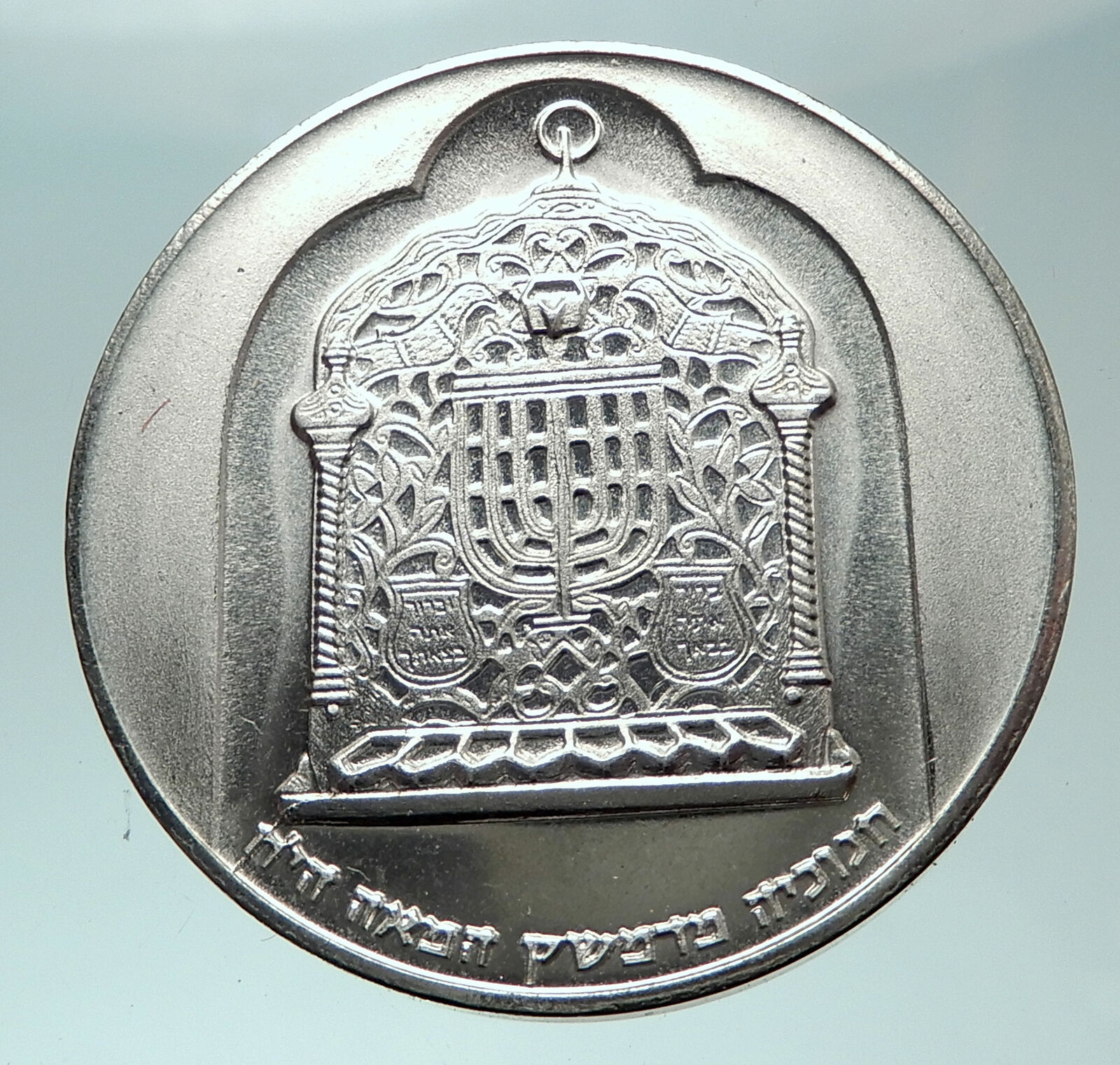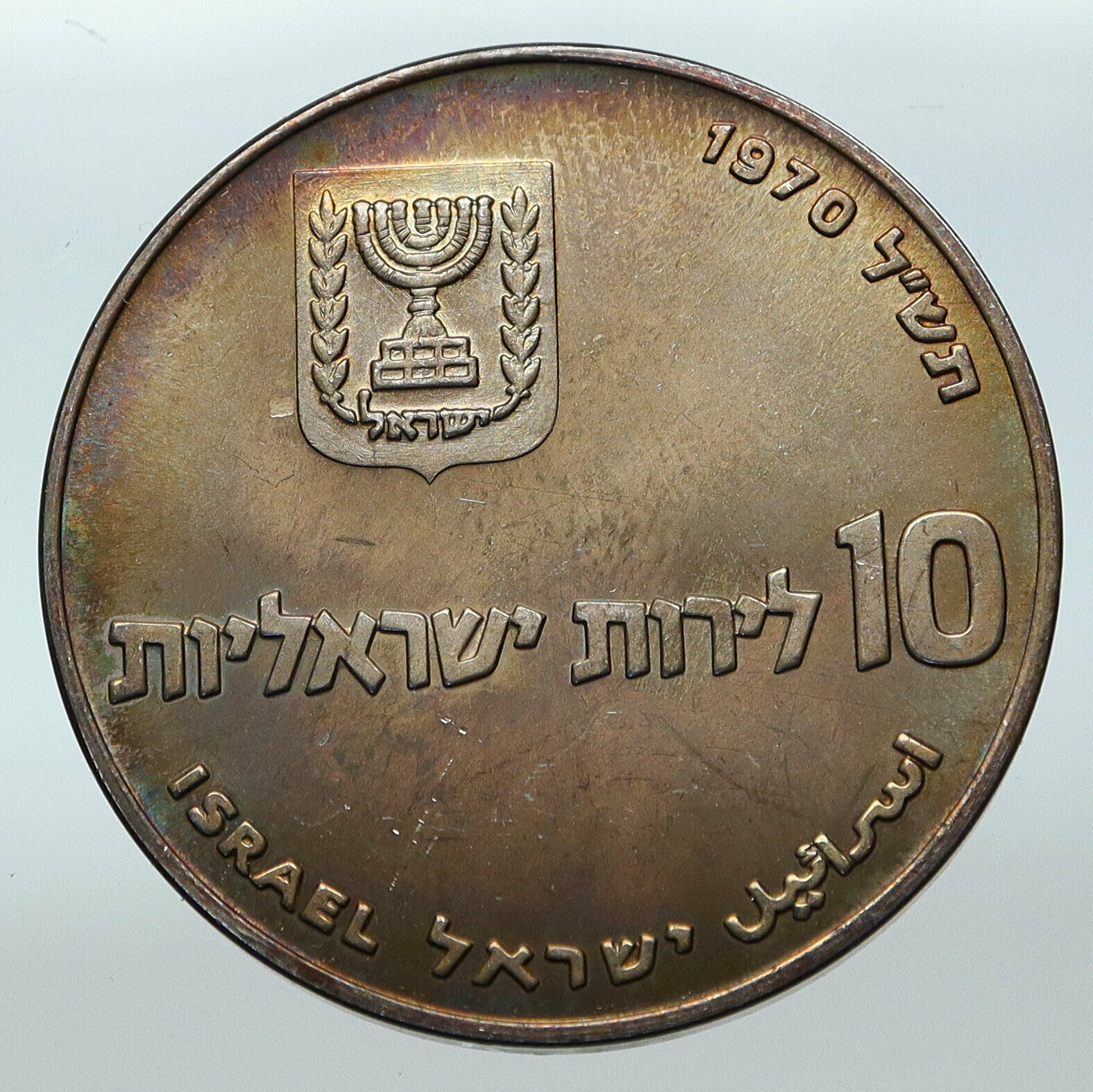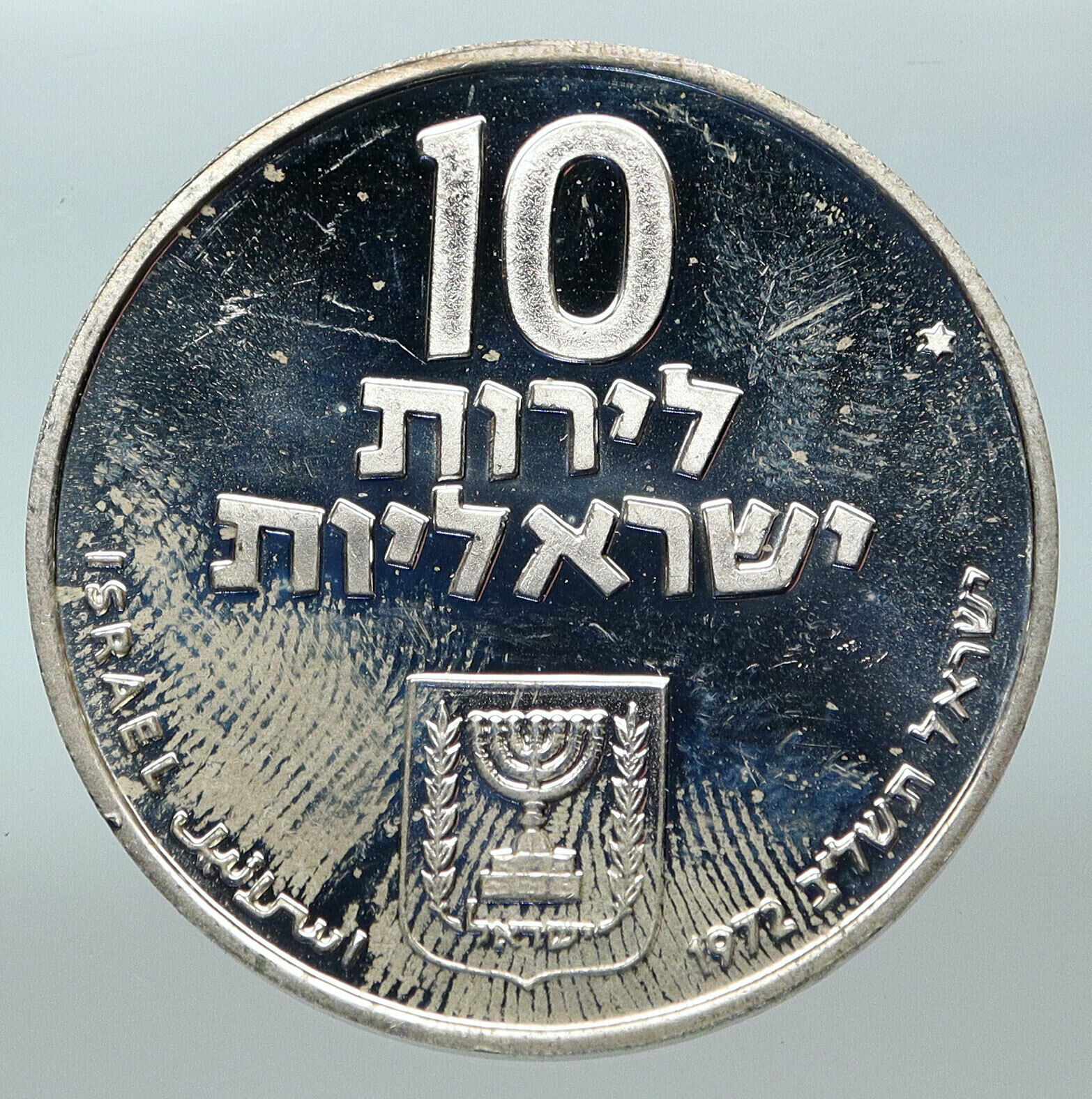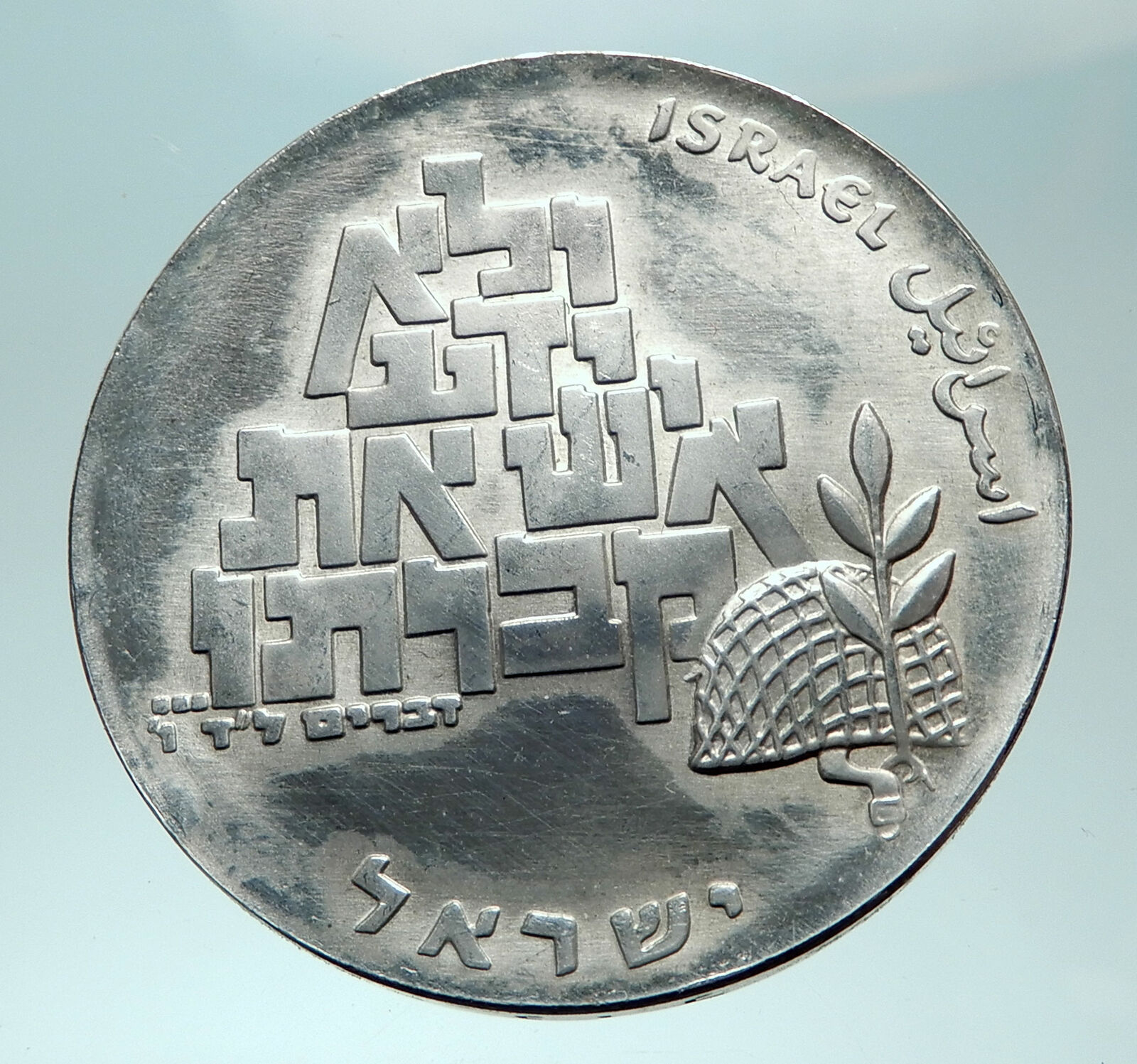|
Israel
Judaic Art – Kiddush Cup
1991 Proof Silver 2 Shekel 37mm (28.80 grams) 0.925 Silver (0.8565 oz. ASW)
Reference: KM# 224, ICMC# 22025385 | Engravers: Ruben Nutels, Tidhar Dagan
Certification: NGC
PF 69 ULTRA CAMEO 2863757-006
ISRAEL ישראל اسرائيل 2 שקלים הדשים NEW SHEQALIM מ , Modern goblet with straight, smooth lines, made by Jerusalem artisan Zelig Segal.
1991 התשנ׳׳ב , Classical style Kiddush Cup from 19th century Germany from the Netherlands Alster Collection. Above is the Israel State Emblem.
You are bidding on the exact item pictured, provided with a Certificate of Authenticity and Lifetime Guarantee of Authenticity.
 Kiddush (/ˈkɪdɪʃ/; Hebrew: קידוש qid’duːʃ]), literally, “sanctification,” is a blessing recited over wine or grape juice to sanctify the Shabbat and Jewish holidays. Additionally, the word refers to a small repast held on Shabbat or festival mornings after the prayer services and before the meal. Kiddush (/ˈkɪdɪʃ/; Hebrew: קידוש qid’duːʃ]), literally, “sanctification,” is a blessing recited over wine or grape juice to sanctify the Shabbat and Jewish holidays. Additionally, the word refers to a small repast held on Shabbat or festival mornings after the prayer services and before the meal.
The Torah refers to two requirements concerning Shabbat – to “keep it” and to “remember it” (shamor and zakhor). Jewish law therefore requires that Shabbat be observed in two respects. One must “keep it” by refraining from thirty-nine forbidden activities, and one must “remember it” by making special arrangements for the day, and specifically through the kiddush ceremony.
Reciting kiddush before the meal on the eve of Shabbat and Jewish holidays is thus a commandment from the Torah (as it is explained by the Oral Torah). Reciting kiddush before the morning meal on Shabbat and holidays is a requirement of rabbinic origin. Kiddush is not usually recited at the third meal on Shabbat, although Maimonides was of the opinion that wine should be drunk at this meal as well.
To honor the mitzvah of reciting kiddush, a silver goblet is often used, although any cup can suffice. The cup must hold a revi’it of liquid. A revi’it is between 161.5 millilitres (5.68 imp fl oz; 5.46 US fl oz) (Rabbi Avrohom Yeshaya Karelitz) and 90.7 millilitres (3.19 imp fl oz; 3.07 US fl oz) (Rabbi Avraham Chaim Naeh). After the person reciting the kiddush drinks from the wine, the rest of it is passed around the table or poured out into small cups for the other participants. Alternatively, wine is poured for each of the participants before kiddush.
Before reciting kiddush, the challah, which will be the next food item eaten in honor of the Shabbat or holiday, is first covered with a cloth. According to Halakha, the blessing over bread takes precedence to the blessing over wine. However, in the interests of beginning the meal with kiddush, the challah is covered to “remove” it from the table (some do not have the challah on the table at all during kiddush). Some interpret the covering of the challah allegorically, explaining that if we are supposed to go out of our way to protect even an inanimate object (the bread) from being “insulted” (by the blessing over wine taking precedence), then certainly we must go out of our way to display sensitivity toward the feelings of other people.
Wine or grape juice may be used for kiddush. The Talmud permits the use of unfermented fresh grape juice for sacramental use. While later legal codes have expressed a preference for wine, traditional and orthodox communities generally permit the use of grape juice in place of wine for blessings and rituals.
On Friday night kiddush may be recited over the challah; the blessing over bread is substituted for the blessing over wine. In that case, the ritual hand-washing normally performed prior to consuming the challah is done before the recitation of kiddush. German Jews follow this procedure even if wine is present. If there is only sufficient wine or grape juice for one kiddush, it should be used for the Friday night kiddush.
In many synagogues, kiddush is recited on Friday night at the end of services. This kiddush does not take the place of the obligation to recite kiddush at the Friday night meal. When recited in a synagogue, the first paragraph (Genesis 2:1–3) is omitted.
The text of the Friday night kiddush begins with a passage from Genesis 2:1–3, as a testimony to God’s creation of the world and cessation of work on the seventh day. Some people stand during the recital of these Biblical verses (even if they sit for kiddush), since according to Jewish law testimony must be given standing.
There are different customs regarding sitting or standing while reciting kiddush depending on communal and family tradition.
Some Hasidic and Sephardic Jews pour small amounts of water into the wine before kiddush on Friday night. This is done either to commemorate the old custom of “mixing of the wine” in the days when wine was too strong to be drunk without dilution, or to infuse the water with the quality of mercy which is symbolized by water.
Since the Shabbat morning kiddush is rabbinically rather than biblically mandated, it has a lesser status than the Friday night kiddush. Its name Kiddusha Rabba (קידושא רבא, “The Great Kiddush“), first mentioned in the Talmud, is euphemistic. There are different versions for the kiddush on Sabbath morning, and it is generally shorter than the Friday night kiddush. Originally, this kiddush consisted only of the blessing over the wine. Later, additional verses related to Shabbat were added. However, there are a wide variety of customs as to which verse are recited, and in some liberal congregations no verses at all are recited.
 Israel (/ˈɪzriəl, ˈɪzreɪəl/; Hebrew: יִשְׂרָאֵל; Arabic: إِسْرَائِيل), officially the State of Israel, is a country in the Middle East, on the southeastern shore of the Mediterranean Sea and the northern shore of the Red Sea. It has land borders with Lebanon to the north, Syria to the northeast, Jordan on the east, the Palestinian territories of the West Bank and Gaza Strip to the east and west, respectively, and Egypt to the southwest. The country contains geographically diverse features within its relatively small area. Israel’s economic and technological center is Tel Aviv, while its seat of government and proclaimed capital is Jerusalem, although the state’s sovereignty over Jerusalem has only partial recognition. Israel (/ˈɪzriəl, ˈɪzreɪəl/; Hebrew: יִשְׂרָאֵל; Arabic: إِسْرَائِيل), officially the State of Israel, is a country in the Middle East, on the southeastern shore of the Mediterranean Sea and the northern shore of the Red Sea. It has land borders with Lebanon to the north, Syria to the northeast, Jordan on the east, the Palestinian territories of the West Bank and Gaza Strip to the east and west, respectively, and Egypt to the southwest. The country contains geographically diverse features within its relatively small area. Israel’s economic and technological center is Tel Aviv, while its seat of government and proclaimed capital is Jerusalem, although the state’s sovereignty over Jerusalem has only partial recognition.

Israel has evidence of the earliest migration of hominids out of Africa. Canaanite tribes are archaeologically attested since the Middle Bronze Age, while the Kingdoms of Israel and Judah emerged during the Iron Age. The Neo-Assyrian Empire destroyed Israel around 720 BCE. Judah was later conquered by the Babylonian, Persian and Hellenistic empires and had existed as Jewish autonomous provinces. The successful Maccabean Revolt led to an independent Hasmonean kingdom by 110 BCE, which in 63 BCE however became a client state of the Roman Republic that subsequently installed the Herodian dynasty in 37 BCE, and in 6 CE created the Roman province of Judea. Judea lasted as a Roman province until the failed Jewish revolts resulted in widespread destruction, expulsion of Jewish population and the renaming of the region from Iudaea to Syria Palaestina.[34] Jewish presence in the region has persisted to a certain extent over the centuries. In the 7th century the Levant was taken from the Byzantine Empire by the Arabs and remained in Muslim control until the First Crusade of 1099, followed by the Ayyubid conquest of 1187. The Mamluk Sultanate of Egypt extended its control over the Levant in the 13th century until its defeat by the Ottoman Empire in 1517. During the 19th century, national awakening among Jews led to the establishment of the Zionist movement in the diaspora followed by waves of immigration to Ottoman and later British Palestine.
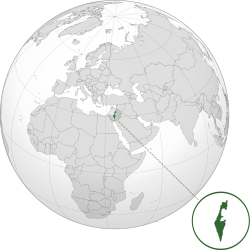 In 1947, the United Nations adopted a Partition Plan for Palestine recommending the creation of independent Arab and Jewish states and an internationalized Jerusalem. The plan was accepted by the Jewish Agency, and rejected by Arab leaders. The following year, the Jewish Agency declared the independence of the State of Israel, and the subsequent 1948 Arab-Israeli War saw Israel’s establishment over most of the former Mandate territory, while the West Bank and Gaza were held by neighboring Arab states. Israel has since fought several wars with Arab countries, and it has since 1967 occupied territories including the West Bank, Golan Heights and the Gaza Strip (still considered occupied after 2005 disengagement, although some legal experts dispute this claim).[41][42][43][fn 4] It extended its laws to the Golan Heights and East Jerusalem, but not the West Bank. Israel’s occupation of the Palestinian territories is the world’s longest military occupation in modern times.[fn 4][49] Efforts to resolve the Israeli-Palestinian conflict have not resulted in a final peace agreement. However, peace treaties between Israel and both Egypt and Jordan have been signed. In 1947, the United Nations adopted a Partition Plan for Palestine recommending the creation of independent Arab and Jewish states and an internationalized Jerusalem. The plan was accepted by the Jewish Agency, and rejected by Arab leaders. The following year, the Jewish Agency declared the independence of the State of Israel, and the subsequent 1948 Arab-Israeli War saw Israel’s establishment over most of the former Mandate territory, while the West Bank and Gaza were held by neighboring Arab states. Israel has since fought several wars with Arab countries, and it has since 1967 occupied territories including the West Bank, Golan Heights and the Gaza Strip (still considered occupied after 2005 disengagement, although some legal experts dispute this claim).[41][42][43][fn 4] It extended its laws to the Golan Heights and East Jerusalem, but not the West Bank. Israel’s occupation of the Palestinian territories is the world’s longest military occupation in modern times.[fn 4][49] Efforts to resolve the Israeli-Palestinian conflict have not resulted in a final peace agreement. However, peace treaties between Israel and both Egypt and Jordan have been signed.
In its Basic Laws, Israel defines itself as a Jewish and democratic state. Israel is a representative democracy[neutrality is disputed] with a parliamentary system, proportional representation and universal suffrage. The prime minister is head of government and the Knesset is the legislature. Israel is a developed country and an OECD member, with the 32nd-largest economy in the world by nominal gross domestic product as of 2017. The country benefits from a highly skilled workforce and is among the most educated countries in the world with one of the highest percentages of its citizens holding a tertiary education degree. Israel has the highest standard of living in the Middle East, and has one of the highest life expectancies in the world.
|









 Kiddush (/ˈkɪdɪʃ/; Hebrew: קידוש qid’duːʃ]), literally, “sanctification,” is a blessing recited over wine or grape juice to sanctify the Shabbat and Jewish holidays. Additionally, the word refers to a small repast held on Shabbat or festival mornings after the prayer services and before the meal.
Kiddush (/ˈkɪdɪʃ/; Hebrew: קידוש qid’duːʃ]), literally, “sanctification,” is a blessing recited over wine or grape juice to sanctify the Shabbat and Jewish holidays. Additionally, the word refers to a small repast held on Shabbat or festival mornings after the prayer services and before the meal. Israel (/ˈɪzriəl, ˈɪzreɪəl/; Hebrew: יִשְׂרָאֵל; Arabic: إِسْرَائِيل), officially the State of Israel, is a country in the Middle East, on the southeastern shore of the Mediterranean Sea and the northern shore of the Red Sea. It has land borders with Lebanon to the north, Syria to the northeast, Jordan on the east, the Palestinian territories of the West Bank and Gaza Strip to the east and west, respectively, and Egypt to the southwest. The country contains geographically diverse features within its relatively small area. Israel’s economic and technological center is Tel Aviv, while its seat of government and proclaimed capital is Jerusalem, although the state’s sovereignty over Jerusalem has only partial recognition.
Israel (/ˈɪzriəl, ˈɪzreɪəl/; Hebrew: יִשְׂרָאֵל; Arabic: إِسْرَائِيل), officially the State of Israel, is a country in the Middle East, on the southeastern shore of the Mediterranean Sea and the northern shore of the Red Sea. It has land borders with Lebanon to the north, Syria to the northeast, Jordan on the east, the Palestinian territories of the West Bank and Gaza Strip to the east and west, respectively, and Egypt to the southwest. The country contains geographically diverse features within its relatively small area. Israel’s economic and technological center is Tel Aviv, while its seat of government and proclaimed capital is Jerusalem, although the state’s sovereignty over Jerusalem has only partial recognition.
 In 1947, the United Nations adopted a Partition Plan for Palestine recommending the creation of independent Arab and Jewish states and an internationalized Jerusalem. The plan was accepted by the Jewish Agency, and rejected by Arab leaders. The following year, the Jewish Agency declared the independence of the State of Israel, and the subsequent 1948 Arab-Israeli War saw Israel’s establishment over most of the former Mandate territory, while the West Bank and Gaza were held by neighboring Arab states. Israel has since fought several wars with Arab countries, and it has since 1967 occupied territories including the West Bank, Golan Heights and the Gaza Strip (still considered occupied after 2005 disengagement, although some legal experts dispute this claim).[41][42][43][fn 4] It extended its laws to the Golan Heights and East Jerusalem, but not the West Bank. Israel’s occupation of the Palestinian territories is the world’s longest military occupation in modern times.[fn 4][49] Efforts to resolve the Israeli-Palestinian conflict have not resulted in a final peace agreement. However, peace treaties between Israel and both Egypt and Jordan have been signed.
In 1947, the United Nations adopted a Partition Plan for Palestine recommending the creation of independent Arab and Jewish states and an internationalized Jerusalem. The plan was accepted by the Jewish Agency, and rejected by Arab leaders. The following year, the Jewish Agency declared the independence of the State of Israel, and the subsequent 1948 Arab-Israeli War saw Israel’s establishment over most of the former Mandate territory, while the West Bank and Gaza were held by neighboring Arab states. Israel has since fought several wars with Arab countries, and it has since 1967 occupied territories including the West Bank, Golan Heights and the Gaza Strip (still considered occupied after 2005 disengagement, although some legal experts dispute this claim).[41][42][43][fn 4] It extended its laws to the Golan Heights and East Jerusalem, but not the West Bank. Israel’s occupation of the Palestinian territories is the world’s longest military occupation in modern times.[fn 4][49] Efforts to resolve the Israeli-Palestinian conflict have not resulted in a final peace agreement. However, peace treaties between Israel and both Egypt and Jordan have been signed. 

